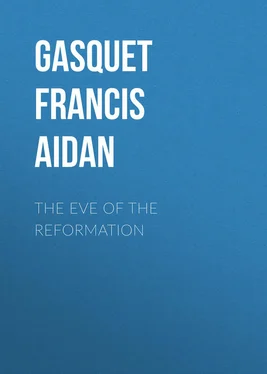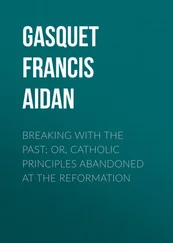Francis Gasquet - The Eve of the Reformation
Здесь есть возможность читать онлайн «Francis Gasquet - The Eve of the Reformation» — ознакомительный отрывок электронной книги совершенно бесплатно, а после прочтения отрывка купить полную версию. В некоторых случаях можно слушать аудио, скачать через торрент в формате fb2 и присутствует краткое содержание. Жанр: foreign_antique, foreign_prose, на английском языке. Описание произведения, (предисловие) а так же отзывы посетителей доступны на портале библиотеки ЛибКат.
- Название:The Eve of the Reformation
- Автор:
- Жанр:
- Год:неизвестен
- ISBN:нет данных
- Рейтинг книги:3 / 5. Голосов: 1
-
Избранное:Добавить в избранное
- Отзывы:
-
Ваша оценка:
- 60
- 1
- 2
- 3
- 4
- 5
The Eve of the Reformation: краткое содержание, описание и аннотация
Предлагаем к чтению аннотацию, описание, краткое содержание или предисловие (зависит от того, что написал сам автор книги «The Eve of the Reformation»). Если вы не нашли необходимую информацию о книге — напишите в комментариях, мы постараемся отыскать её.
The Eve of the Reformation — читать онлайн ознакомительный отрывок
Ниже представлен текст книги, разбитый по страницам. Система сохранения места последней прочитанной страницы, позволяет с удобством читать онлайн бесплатно книгу «The Eve of the Reformation», без необходимости каждый раз заново искать на чём Вы остановились. Поставьте закладку, и сможете в любой момент перейти на страницу, на которой закончили чтение.
Интервал:
Закладка:
113
Of the olde God and the new , B. 1. As another sample of what was at this time said about the Popes, we may take the following: Rome, says the author, “was by Justinian restored from ruin and decay, from whence also came the riches of the Church. At the coming of these riches, forthwith the book of the gospel was shut up, and the Bishops of Rome, instead of evangelical poverty, began to put forth their heads garnished with three crowns.” This is taken from the preface of Hartman Dulechin, who claims to have “taught the book to speak Latin.” It was originally printed and published in German. The English version is a translation of the Latin.
114
The Defence of Peace, written in Latin more than 200 years ago, and set forth in the English tongue by Wyllyam Marshall. R. Wyer, 1535, folio.
115
The Defence of Peace , f. 42. The well-known anti-papal opinions of Marsilius of Padua are, of course, of no interest in themselves, but their publication at this time in English shows the methods by which it was hoped to undermine the Papal authority in the country.
116
Exposition , &c., ut supra , f. i.
117
Johann Sturmius, Epistle sent to the cardinals and prelates that were appointed by the Bishop of Rome to search out the abuses of the Church . Translated by Richard Morysine. Berthelet, 1538.
A later copy of the Concilium de emendanda Ecclesia , printed by Sturmius with his letter in 1538, in the British Museum, formerly belonged to Cecil. The title-page has his signature, “Gulielmus Cecilius, 1540,” and there are marks and words underlined, and some few observations from his pen in the margin. It is interesting to note that what struck the statesman as a youth were just the points which could be turned against the temporal claims of the Roman See.
The special evils needing correction which the committee of cardinals note, and which they call abuses , are collected under 22 headings, some of which are the following: —
(1) Ordination of priests without cure of souls, not learned, of lower order in life, and too young and of doubtful morals: They suggest that each diocese should have a magistrum to see that candidates are properly instructed – none to be ordained except by their own bishop.
(2) Benefices, and in particular, episcopal sees, are given to people with interest, and not because their elevation would be good for the church. They suggest that the best man should be chosen, and residence should be insisted on, and consequently “non Italo conferendum est beneficium in Hispania aut in Britannia aut ex contra.”
(3) Pensions reserved from Benefices. Though the Pope, “who is the universal dispenser of the goods of the church,” may reserve a part for a pious use, e. g. for the poor, &c., still not to reserve sufficient for the proper purpose of the beneficiary, and still more to give a pension out of a benefice to one rich enough without, is wrong.
(4) Change of benefices for the sake of gain, and handing on benefices by arrangement or always assigning episcopal sees to coadjutors, is the cause of outcry against the clergy, and is in reality making private property out of what is public.
(5) Permission to clergy to hold more than one benefice.
(6) Cardinals being allowed to hold sees. They ought to be counsellors to the Pope in Rome, and when holding sees they are more or less dependent on the will of the kings, and so cannot give independent advice and speak their minds.
(7) Absence of bishops from their sees.
(8) Such religious houses as needed correction should be forbidden to profess members, and when they die out, their places should be taken by fervent religious. Confessors for convents must be approved by the ordinaries of the place.
(9) The use of the keys ought never, under any pretext, to be granted for money.
(10) Questors of the Holy Spirit, St. Anthony, &c., who foster superstition among the poor people, should be prohibited.
(11) Confessional privileges and use of portable altars to be very rarely allowed.
(12) No indulgences to be granted except once a year, and in the great cities only.
Finally they say of Rome: “Hæc Romana civitas et ecclesia mater est et magistra aliarum ecclesiarum,” and hence it should be a model to all. Foreigners, however, who come to St. Peter’s find that priests “sordidi, ignari, induti paramentis et vestibus quibus nec in sordidis ædibus honeste uti possent, missas celebrant.”
Cardinal Sadolet, on receiving a copy of Sturmius’s letter, replied in kindly terms. He had, he declared, a high opinion of “Sturmius, Melanchthon, and Bucer, looking on them as most learned men, kindly disposed, and cordially friendly to him. He looked upon it as the peculiar characteristic of Luther to try and overwhelm all his opponents with shouts and attacks.” He speaks of the great piety of Pope Clement from personal knowledge. His wars were, he said, rather the work of his adversaries than his own ( De consilio , ed. J. G. Schelhorn, 1748, p. 91).
He also, in 1539, penned the De Christiana Ecclesia (in Specilegium Romanum , ii. p. 101 seqq. ), sending it to Cardinal Salicati, and asking him to pass it on to Cardinal Contarini. It was the outcome of conversations about the troubles of the Church, and the result of the movement was the Council of Trent, to restore, as Sadolet says, ecclesiastical discipline “quæ nunc tota pæne nobis e manibus elapsa est.”
118
Sermon on Palm Sunday , Berthelet, 1539.
119
Lancelot Ridley, Commentary in Englyshe on Sayncte Paule’s Epystle to the Ephesians , L. 4.
120
This important paper was printed for the first time in the Dublin Review , April 1894, pp. 390-420.
121
A treatise concerning the division between the spiritualtie and temporaltie. London: Robert Redman, f. 2.
122
English Works , p. 871. In the quotations made from the works of Sir Thomas More and other old writings, for the sake of the general reader the modern form of spelling has been adopted, and at times the words transposed to ensure greater clearness.
123
Ibid., p. 875.
124
Ibid., p. 882.
125
Salem and Bizance. A dialogue betwixte two Englishmen, whereof one was called Salem and the other Bizance. London: Berthelet, 1533, f. 5.
126
English Works , p. 934.
127
Ibid., p. 870.
128
Ibid., p. 877.
129
Ibid., p. 877.
130
Ibid., p. 878.
131
Ibid., pp. 937, 938.
132
A treatise concerning the division , f. 8.
Интервал:
Закладка:
Похожие книги на «The Eve of the Reformation»
Представляем Вашему вниманию похожие книги на «The Eve of the Reformation» списком для выбора. Мы отобрали схожую по названию и смыслу литературу в надежде предоставить читателям больше вариантов отыскать новые, интересные, ещё непрочитанные произведения.
Обсуждение, отзывы о книге «The Eve of the Reformation» и просто собственные мнения читателей. Оставьте ваши комментарии, напишите, что Вы думаете о произведении, его смысле или главных героях. Укажите что конкретно понравилось, а что нет, и почему Вы так считаете.












